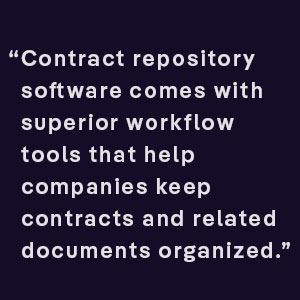Contract repository software has never been more essential than it is in today’s global economy. It allows companies to ditch those shared drives and filing cabinets, and store and manage contracts in a secure, centralized location. It helps them work with other organizations, in various parts of the world, and improve engagement with vendors whilst weaving out underperforming or non-compliant ones.
Clearly, then, having a contract repository is vital to business success. But what exactly should your company look for when trying to find the right contract management system? What features and functionalities will work best for your organization and its specific needs?
Improved Contract Security
When choosing contract repository software, companies should keep security top of mind.
Not having rigid security measures in place can put a company at enormous risk, as it opens the business up to liabilities like data breaches. Accordingly, companies need to ensure that sensitive data is always protected. And the best way to do that is using contract repository software that safeguards customer data at the highest levels, such as being certified to a SOC 2, Type II standard. Systems should include stringent data encryption methods and utilize Google Cloud Platform for information hosting. They should involve regular testing for penetration vulnerability, and comply with GDPR and the privacy policy requirements.
Centralized Contract Repository
Obviously, another main feature of this software is a repository — or a centralized location — that helps legal and other departments store and manage agreements. Systems with a reliable repository function make work life much easier for all parties, as they help collaborators find all contracts and related documents easily and quickly. They help them keep track of changes to legal documents by their colleagues. Further, centralized repositories are equipped with reminders for auto-renewals, which eliminates the need to rely on human memory!
Typically speaking, a contract’s metadata contains basic information, like the names of signatories, the value of the contract, the type of contract, and the expiration or renewal date. Another benefit of having a repository, then, is being able to make this information available to entire teams. This way, everyone is kept informed about a contract — at all times — and the responsibility of keeping others in the proverbial loop does not fall on a single person.
Streamlined Contract Creation
Having a centralized place for agreements also helps streamline the creation of contracts — buy-side and sell-side, noncommercial, administrative, and NDAs — or extend new child contracts from parent ones.
That is because contract repository software comes with superior workflow tools that help companies keep contracts and related documents organized. For example, it includes a drag-and-drop interface that allows for quick and accurate contract building. Plus, it provides transparency to all collaborators, eliminating unnecessary questions about contract drafts and encouraging even more collaboration between parties.
With the support of contract repository software, contract creation can be as simple as uploading or choosing from a pre-existing outline, labeling fields that need to be completed by another party, and adding both approvers and signers. Having templates that are highly customizable makes for a streamlined and compliant authoring process, too. Systems allow companies to fully customize templates according to the user(s), the type of contract, the supplier(s), and so on.
Better Contract Collaboration
Even though contract repositories remove the need to inform other collaborators of progress or changes during a contract’s lifecycle, communication is still vital. This is especially true when making and reviewing contract amendments. The good news is that contract repository software facilitates communication between collaborators. It ensures each party has access to the most up-to-date version of a contract, making sure that everyone is on the same page. It allows instantaneous and seamless comments on — and revisions to — agreements. At the end of the day, contracts can be revised and approved in mere minutes.
But no matter how sophisticated a repository is, if it is difficult to use, companies will not see a high rate of adoption across users. So, when choosing contract repository software, companies should make sure it includes intuitive, easy-to-use contract management tools. The system should also make navigation fairly straightforward, increasing compliance and adoption across the enterprise.
Faster Time to Signature
In this day and age, contract repository software should have an electronic signature feature, too. By ‘going paperless,’ you can not only track contracts from a central location — from the initial draft all the way to approval and execution — but also employ digital tools provided by the repository, such as e-signature. The latter provides an even better contracting process and experience, as contracts can be signed remotely — and even on a smartphone!
Contract Visualization and Reporting
Finally, contract repositories are so rich in information that collaborators need to gain insights into contracting processes. To get a better picture of what is going on with contracts, then, they require in-depth reports and highly visualized dashboards. Many companies use this reporting and dashboard feature as a benchmark to track KPIs. The latter is then used to enhance the performance of agreements and the contracting process altogether.
What is more, contract collaborators need to be able to select relevant columns of data — and filter, sort, and group the same They need to generate reports in real-time, and either export those results or save them for personal use.
Naturally, there are other features and functionalities to look out for when searching for contract repository software. ContractPodAi Cloud’s central contract repository, for instance, provides full contract visibility. It helps legal and other teams create, store, and manage documents — all in one secure place. For more information on ContractPodAi’s One Legal Platform, talk to one of our digital transformation experts today!
Author:

Anurag Malik
Connect with us on Linkedin










